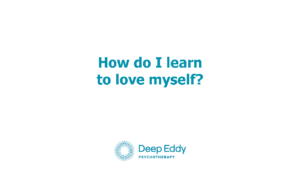Charlotte Howard, a therapist at Deep Eddy Psychotherapy in Austin, TX, talks about the benefits of therapy for self love and how learning to love yourself starts by being a good parent to yourself.
What Does Self-Love Mean, and Why Should It Matter to You?
Self-love is about embracing your worth and treating yourself with kindness, care, and respect. It’s not about being self-centered or selfish—it’s about recognizing that you deserve love and compassion just like anyone else. When you practice self-love, you create a foundation for healthy relationships, personal growth, and emotional resilience.
Why does it matter? Because self-love impacts every area of your life. It helps you set boundaries, make choices aligned with your values, and navigate challenges with grace. Without it, you may find yourself stuck in cycles of self-doubt, overworking, or seeking external validation. Cultivating self-love allows you to show up as your best self, not just for you, but for the people around you. It’s a vital step in building a life that feels fulfilling and authentic.
Therapy for Self Love
Self-care and therapy are like best friends on the journey to learning how to love yourself—they support and strengthen each other. Self-care is about tending to your needs with compassion, whether it’s taking a moment to breathe, saying “no” when you’re overwhelmed, or nourishing your body and mind. Therapy takes this a step further, helping you uncover what’s beneath the surface and guiding you to make self-care choices that truly heal and restore.
In therapy, you’ll learn that self-care isn’t selfish—it’s the foundation for a healthier, more balanced you. By untangling old patterns and inviting kindness into your daily life, therapy and self-care work together to help you feel more whole and connected to yourself.
Healing the Wounds from Childhood
We naturally love ourselves if we got what we needed in childhood. A lot of learning to love yourself is actually healing the wounds and traumas from childhood. The places we got neglected or hurt need to heal.
Somehow, we got the message that we were not good enough. Kids think that most things are their fault, including parents’ divorces or parents’ being tired or critical. The problems between the parents are often misinterpreted unconsciously by children and they start to not feel good enough. Or when a parent is not present behind his or her eyes because of depression or lack of emotional availability, kids’ sense of self suffers.
Maybe a child didn’t receive enough attention from the parents to feel adored, special, and important. Or sometimes the situation is more actively abusive and traumas make people feel they’re bad or feel ashamed of who they are. Healing starts by looking at those experiences and really having them held and de-shamed to know it’s not your fault.
Therapy Helps You Begin to Love Yourself
Being able to talk through those experiences and bring love to your inner child is the deep healing needed to start to love yourself. Throughout the therapeutic relationship, and ultimately by internalizing it, you can begin to have a more loving relationship with yourself. You heal the wounds as you take in love and nurturance from the therapeutic relationship, and, over time, from the relationship with yourself. As you learn to receive in therapy, your sense of self-love grows stronger and stronger as you can now take in the love that was available from those who care about you as well, such as healthy friends and family members.
Learning to Better Receive Love
The work is about telling yourself that you deserve to receive love and allowing yourself to trust others even when you disagree with their kind opinions of you or feel scared of the generosity or intimacy others try to share with you. You don’t have to be perfect to receive love. It’s about just recognizing that humans are imperfect. You can join the human race and see that all are flawed and all are beautiful in our imperfections. We all need love, mercy, and care. If you understand that it’s a universal experience and begin to see yourself as being part of it instead of holding yourself apart and thinking that somehow you’re especially bad, loving yourself begins to come naturally.
Being a Good Parent to Yourself
Being a good parent to yourself is an important aspect of loving yourself. It’s not only learning to be loving and nurturing with yourself, it is also about having good, loving, boundaries. For instance, “Oh beloved, if you eat the 4th ice cream cone, you’re going to feel sick.” While you need these kind of boundaries to protect your mind and body, you also need mercy from your internal parent so you don’t rebel against yourself. You might say, “Oh, if you really want that icecream, then enjoy it–guilt free.”
Starting Your Journey to Self-Love with Deep Eddy
Taking the first step toward healing can feel daunting, but we’re here to make it easier. At Deep Eddy Psychotherapy in Austin, TX, we offer a complimentary consultation to explore your options and see if our practice is the right fit for you. Let’s work together to create a space where you feel supported, understood, and empowered.
Reach out using the link below to schedule your call. If you found this post helpful, we’d be grateful if you shared it with someone who might benefit. Together, we can build a world rooted in well-being and connection.

